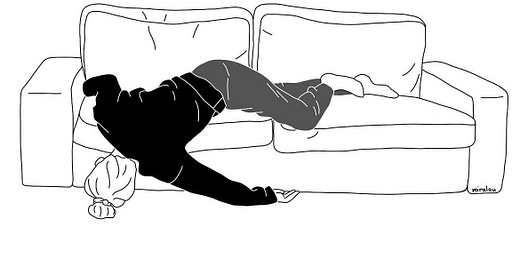Accuracy 10/10. Illustration used with permission from Mira Lou
Friday greetings,
My big news this week is that I woke up yesterday to see my picture on the home page of the Daily Hampshire Gazette website (and the front page of the Arts & Section in the print edition!), accompanied by the feature article, Declutter your mind, with some help: Local author offers 201 prompts of “Fierce Encouragement” to aspiring writers. I’ve included the full article below.
I love the title Carolyn Brown chose, and it happens to fit perfectly with a brand-new offering I’m cooking up for us called Get Your Brain Back. Stay tuned, as I’m jazzed to work on it and will be opening registration soon.
The idea for this new offering came in a whoosh on Wednesday as I made dinner after an exceptionally slackerish day. We are talking about puttering-around-the-backyard-filling-the-birdfeeders-watching-Severance-midday-followed-by-a-couch-nap levels of unproductive.
Of course, this all hinges on how we define “productive.”
Does “productive” only apply to the experience of making outward progress on the (very) long to-do list of work commitments and life responsibilities? While all of these matter, without question, very few of them are – if we are being honest – truly urgent.
Hey, it’s me! Illustration used with permission from Mira Lou
If I had a j-o-b and a steady paycheck, I suppose this would be called a “mental health day.” Since I am self-employed and my income varies, taking time off without stressing about it is, shall we say, a practice. But what I remembered this week was that sometimes it’s only after surrendering that new ideas spring up, thanks to our well being replenished (and thus our wellbeing being replenished – oh, how I love some good wordplay).
As I write this, it dawns on me that it’s intimately connected to a chapter in the new book that might not seem to fit at first blush. It’s called “The Art of Doing Nothing,” and like the other chapters, it contains 10 prompts.
But they aren’t writing prompts.
Here’s what Carolyn Brown wrote in the Gazette article (and what I told her about why I decided to keep this chapter):
Interestingly, one chapter of this book contains no writing prompts – instead, each entry is a “Not-Doing Activity,” like watching a sunset or staring at the ceiling. Schwartz wasn’t sure if she should include that chapter at first, but ultimately decided against her own doubts.
“I left it in because I wanted to integrate and normalize not writing and not pushing as part of a bigger creative process and the importance of that, the importance of taking time and learning how to let that count, whether that’s taking a walk or taking a nap or sitting on a bench.” The writing process itself, she said, is “not only about getting words on the page. I really wanted to bring in that permission and gentleness, too.”
Normalize not writing as part of a writing life. Normalize not pushing as part of the creative process. Normalize days when you feel like you “did nothing.”
If you need fierce encouragement to start and/or keep going today, I hope this week’s Dispatch gives you just that.
And if you need permission and gentleness to be a total slacker for a hot minute or (gasp) a whole day, I hope you find that here, too.
The two are not opposites but rather symbiotic parts of a whole life, ingredients for staying fully human in a world that wants our attention splintered, smashed, fractured, and fragmented into a million pieces.
Take care of you! It’s what Shabbat (and the occasional Wednesday) is for.
Shabbat Shalom and love,
Jena
Feature article by Daily Hampshire Gazette staff writer Carolyn Brown:
https://www.gazettenet.com/Fierce-Encouragement-March-27-60171970
Author Margaret Atwood supposedly once said, “If I waited for perfection, I would never write a word.” With a new book, “Fierce Encouragement: 201 Writing Prompts for Staying Grounded in Fragile Times,” author and writing coach Jena Schwartz wants to inspire writers to build their own creative practices, no matter if the result isn’t entirely perfect.
The book is set up such that a reader (well, writer) should choose a prompt, read it, then follow it for 10 minutes, unless otherwise specified. Many of the prompts ask the reader to consider something — an exit, a twist, the color blue. (“If you get lost, you can always default to something like blah blah blah blah until other words come, which — and this I promise you — they always do,” Schwartz writes.)
Some prompts are straightforward, only a single sentence: “Tell me where in the world you were,” says one. “Tell me what you see in the mirror,” says another.
Some are more complex: “Tell me what you wonder about;” “Tell me about being in the wrong;” “Tell me about being the change.”
Each prompt comes with an epigraph and some introductory text — sometimes a poem, sometimes an anecdote from Schwartz’s life. At times, the stories get very vulnerable, touching on Schwartz’s experiences with parenthood, divorce, and bulimia.
Sometimes, they also offer poignant quotes: in “Broken Glass,” Schwartz says, “Overthinking is like feeding your inner critic fresh grapes by hand.” In “The First Time You Prayed,” she defines love as “the air we’re both breathing, the spaces between syllables, the unspeakable, the unknowable, and the obvious. It has no agenda. It is the multiplier of mystery and the sum of its parts. It is safe border crossing, and it doesn’t require a signature if you’re not home.”
By the way: why 201 prompts instead of an even 200? Schwartz, who lived in Amherst for over four decades [Jena's note: actually 20 years over a 40-year period – details shmetails] and moved to Longmeadow last year, was thinking of a line from an Emily Dickinson poem, “Tell all the truth but tell it slant,” which became the inspiration for the second prompt in “Fierce Encouragement.” Since the book overall encourages readers to put words to paper without worrying if they’re perfect, the number made sense, she said: “201 has that feeling of being a little not neatly wrapped up.”
And what is “fierce encouragement” specifically? That title – which also shares its name with Schwartz’s coaching business – refers to a sense of a “really unwavering, focused quality of encouragement that’s more than just pom-poms.” [Jena's note: I do love a good pom-pom!]
“That fierceness,” Schwartz said, has “this quality of, ‘I’ve got you, I’m in this with you, you’re not alone’” and “is really about saying, ‘I’m gonna keep showing up for you’ and encouraging people to really keep showing up for themselves.”
Interestingly, one chapter of this book contains no writing prompts – instead, each entry is a “Not-Doing Activity,” like watching a sunset or staring at the ceiling. Schwartz wasn’t sure if she should include that chapter at first, but ultimately decided against her own doubts.
“I left it in because I wanted to integrate and normalize not writing and not pushing as part of a bigger creative process and the importance of that, the importance of taking time and learning how to let that count, whether that’s taking a walk or taking a nap or sitting on a bench.” The writing process itself, she said, is “not only about getting words on the page. I really wanted to bring in that permission and gentleness, too.”
In the book’s very last chapter, Schwartz asks the reader, “Tell me about the ancestors, and the ones to come.” She’s motivated by the Hebrew phrase “l’dor v’dor,” meaning “from generation to generation,” and while she was out for a run one day, she had an image of her ancestors cheering her on.
“And it was in that moment,” she wrote, “that I realized: Maybe courage is not a thing we have to conjure. Maybe courage is our birthright. Maybe courage comes to us through our DNA, in the songs of birds, and the memories that live in the forests and ocean waters and our very bones.
“Ending with the ancestors in the book is a way of acknowledging both the past, but also the future, and just knowing that whatever I bring forth and offer to the world is part of this long infinite chain, and there’s something really special for me about placing myself in a context that’s much bigger and older than I am,” she said.
Schwartz didn’t even set out to make a book of writing prompts when she started what would eventually become “Fierce Encouragement.” She wrote the book’s first 10 prompts as part of a writing group she was leading in December 2014; she wrote the next 10 for a group she led the following month. As time went on, she found herself writing more and more prompts. By the time the pandemic hit, she said, “I had all this creative material that was just sitting there on my computer. I thought it would be really wonderful to make all of that available to people.”
The origin story for her own book, as it happens, matches nicely with the philosophy that Schwartz has for writers: “Start anyway and keep going and let everything count, because you never know where it’s going to lead.”
“Fierce Encouragement: 201 Writing Prompts for Staying Grounded in Fragile Times” is available for $18 paperback or $8.99 on Kindle via Amazon and BookBaby.
✨ Purchase and/or leave a review on Amazon
✨ Purchase and/or leave a review on BookBaby









What I needed today, even though I actually accomplished a few tasks. Felt really good to just slow it down and allow partially finished be "good enough". Shabbat Shalom.
Great gazette feature! And yes, Jena, it's also called "dolce far niente" and I claim it is critical to our well being to incoprporate this, unapologetically, into our weekly rhythms. Did you see my recent post about just this? https://ninablichtenstein.substack.com/p/dolce-far-niente-in-aruba-or-anywhere